
Blood, Sweat & Tears is an American jazz rock music group founded in New York City in 1967, noted for a combination of brass with rock instrumentation. BS&T has gone through numerous iterations with varying personnel and has encompassed a wide range of musical styles. Their sound has merged rock, pop and R&B/soul music with big band jazz.

Child Is Father to the Man is the debut album by Blood, Sweat & Tears, released in February 1968. It reached number 47 on the Billboard pop albums chart in the United States.

Al Kooper is a retired American songwriter, record producer, and musician, known for joining and naming Blood, Sweat & Tears, although he did not stay with the group long enough to share its popularity. Throughout much of the 1960s and 1970s he was a prolific studio musician, including playing organ on the Bob Dylan song "Like a Rolling Stone", French horn and piano on the Rolling Stones song "You Can't Always Get What You Want", and lead guitar on Rita Coolidge's "The Lady's Not for Sale". Kooper produced a number of one-off collaboration albums, such as the Super Session album that saw him work separately with guitarists Mike Bloomfield and Stephen Stills. In the 1970s Kooper was a successful manager and producer, recording Lynyrd Skynyrd's first three albums. He has had a successful solo career, writing music for film soundtracks, and has lectured in musical composition. Kooper was selected for induction for the Rock and Roll Hall of Fame in 2023.
Robert Wayne Colomby is a jazz-rock fusion drummer, record producer and television presenter. He is best known as an original member of the group Blood, Sweat & Tears, which he co-founded in 1967. He has also played with many other musical artists.

Thomas "Bones" Malone is an American jazz musician, arranger, and producer. As his nickname implies, he specializes on the trombone but he also plays saxophone, trumpet, tuba, flute, and bass guitar. He has been a member of the Blues Brothers, Saturday Night Live Band, Blood, Sweat & Tears, and the CBS Orchestra, the house band for the Late Show with David Letterman.
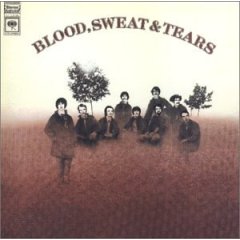
Blood, Sweat & Tears is the second album by the American band Blood, Sweat & Tears, released on December 11, 1968. It was the most commercially successful album for the group, rising to the top of the U.S. charts for a collective seven weeks and yielding three successive Top 5 singles. It received a Grammy Award for Album of the Year in 1970 and has been certified quadruple platinum by the RIAA with sales of more than four million units in the U.S. In Canada the album enjoyed a total of eight weeks at number 1 on the RPM national album chart.
David W. Bargeron is an American trombonist and tuba player who was a member of the jazz-rock group Blood, Sweat & Tears.
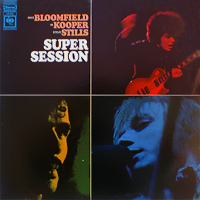
Super Session is an album by singer and multi-instrumentalist Al Kooper, with guitarists Mike Bloomfield on the first half and Stephen Stills on the second half. Released by Columbia Records in 1968, it peaked at No. 12 on the Billboard 200 during a 37-week chart stay and was certified gold by RIAA.

Blood, Sweat & Tears 3 is the third album by the band Blood, Sweat & Tears, released in June 1970.

B, S & T; 4 is the fourth album by the band Blood, Sweat & Tears, released in June 1971. It peaked at number 10 on the Billboard Pop albums chart.
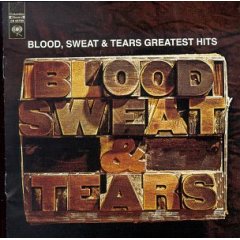
Greatest Hits is a compilation album by the band Blood, Sweat & Tears, initially released in February 1972.

The Blues Project was an American band formed in New York City's Greenwich Village neighborhood in 1965. The group's original iteration broke up in 1967. Their songs drew from a wide array of musical styles. They are most remembered as one of the most artful practitioners of pop music, influenced as it was by folk, blues, rhythm & blues, jazz and the pop music of the day.
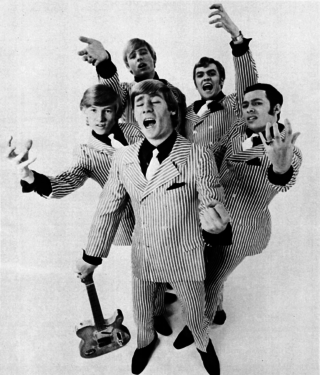
Mandala was a Canadian R&B and soul band from the 1960s. The band was formed in 1965 in Toronto, Ontario as The Rogues and changed their name prior to their first Canadian Top 40 hit "Opportunity".

"Spinning Wheel" is a song from 1968 by the band Blood, Sweat & Tears, written by Canadian lead vocalist David Clayton-Thomas and appearing on their eponymous album.

Steven Katz is a guitarist, singer, and record producer who is best known as a member of the rock-pop-jazz group Blood, Sweat & Tears. Katz was an original member of the rock bands the Blues Project and American Flyer. As a producer, his credits include the 1979 album Short Stories Tall Tales for the Irish band Horslips, and the Lou Reed albums Rock 'n' Roll Animal and Sally Can't Dance and the Elliott Murphy album Night Lights.

The Owl and the Pussycat is the soundtrack album to the 1970 American film of the same name. Released by Columbia Records, it features film dialogue by Barbra Streisand and George Segal recorded over music performed by American band Blood, Sweat & Tears. The album's five tracks were all written by Buck Henry, produced by Thomas Z. Shepard.

In Concert is a double live album by the band Blood, Sweat & Tears, that was released in Europe and Japan in 1976. This album was remixed and released in the United States as Live and Improvised in 1991 by Columbia/Legacy and again in 2012 as "In Concert" by Wounded Bird. This collection was recorded live at four different venues over five nights during the summer of 1975. The lineup for this album is the same as the New City album they were supporting on that tour with the exception of Steve Khan and Mike Stern on guitar.

Live and Improvised is a two compact disc live album by the band Blood, Sweat & Tears, that was originally released in 1976 as a live album entitled In Concert by Columbia Records in Europe and Japan. This album was later remixed and released in the United States as Live and Improvised in 1991 by Columbia/Legacy and again as "In Concert" in 2012 by Wounded Bird, with a different cover. This collection was recorded live at four different venues over five nights during the summer of 1975. The lineup for this album is the same as the New City album they were supporting on that tour with the exception of Steve Khan and Mike Stern on guitar.
Jerry Donald Fisher is an American R&B singer – Texas-born and Oklahoma-reared – known internationally for being the lead vocal with Blood, Sweat & Tears from 1971 to 1975. He is known to Dallas music fans for his R&B gigs from 1964 to 1972, and known in Bay Saint Louis as one-half of the husband–wife proprietorship of "Dock of the Bay," a restaurant and nightclub owned and operated by the two from 1976 to the spring of 2005, when they sold it a few months before Hurricane Katrina blew it away.
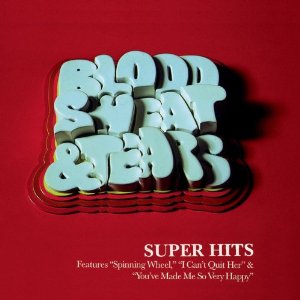
Super Hits is a budget compilation album by the band Blood, Sweat & Tears released by Columbia Records in 1998. This ten song collection draws four songs from each of the band's first two albums Child Is Father to the Man and Blood, Sweat & Tears.

















